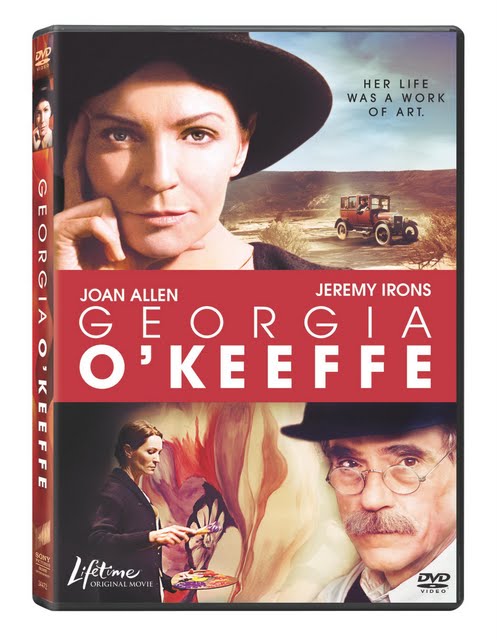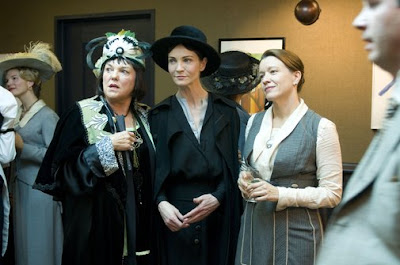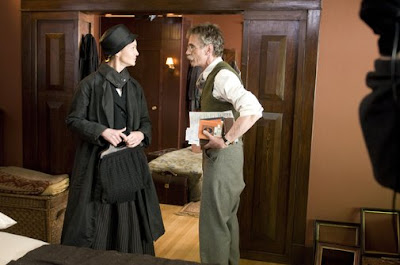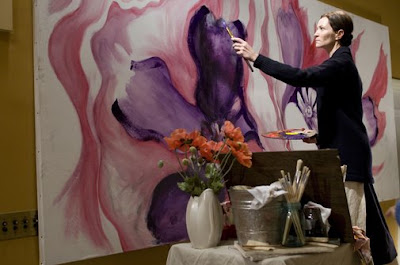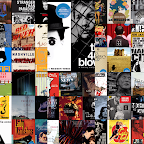5/09/2010
DVD Review: Georgia O'Keeffe (2009)
Since she didn't trust words -- nor were words and Georgia O'Keeffe very good friends -- the American artist known as the most significant female painter in history never claimed to know what the meaning was of either art or her work in particular. She understood only that she knew what wouldn't be considered art and had know qualms about burning any one of her paintings that she felt didn't live up to the lofty term.
That she should have difficulty using words makes it both fascinating and a little dangerous that Ms. O'Keeffe would fall for a man who used words very well, which she did in 1916 when she came upon gallery owner Alfred Stieglitz, who was showing her sketches without her consent.
Demanding that they be taken down, Stieglitz was quick to talk her out of such a bold move. And quickly we see the Wisconsin native embodied by Joan Allen begin to melt a little under the rich cadences of Stieglitz (Jeremy Irons), whom she compliments with a remark meant flirtatiously between the writer, actress and her audience when she tells him, “you sure can talk.”
Like Julie Taymor's Frida, this high quality, suitably picturesque and sophisticatedly satisfying biopic predominately concerns itself with the emotionally tempestuous relationship between the lovers that it could've perhaps been called “Georgia and Alfred” a la director Bob Balaban's previously acclaimed work for HBO Bernard and Doris.
We find in Allen's independently minded and bold portrayal of Georgia, a self-confident and direct woman who seems to instinctively know that this man she prefers to affectionately call “Mr. Stieglitz” throughout is her man, making the first move of the then-married and legendary seducer known for collecting lovers as though they were playthings until he would become her very own legal husband for better or worse.
And although she was considered homely by a mother who would hide her away from company, Alfred finds in Georgia the very essence of feminine grace, becoming what O'Keeffe considered the father of Modern American Photography through a series of gorgeously rendered but scandalous nude photos of the painter that suddenly made her infamous and her work the most coveted property in the art world.
However, Alfred's roving eyes, way with words and voracious appetite for ambition and “more, more more,” threatens to drive a wedge in his relationship with O'Keeffe when a blatant infidelity and lengthy relationship with a young, beautiful, bored, married benefactor pushes the painter to the brink of breakdown and she journeys out west to Taos, New Mexico to heal.
Time apart turns into time to develop her signature style as the Taos landscape became synonymous with O'Keeffe for the next several decades. And although the acclaimed made-for-Lifetime film is radiantly photographed and technically superior thanks to the wonderful portrayals of its two leads and the professionals working behind the camera including its Pulitzer Prize winning screenwriter Michael Cristofer, ultimately there's not enough plot to intoxicate us for even its succinct 89 minute running time.
While Cristofer tries his hardest to make the somewhat typical artist biopic plot-line sing with more originality with some exquisite narration for Allen, it's nonetheless well worth a look for devotees of O'Keeffe who may only know her as the woman who painted so many gorgeous flowers. For overall, it's the flowers and the rest of her memorable strokes on canvas you'll remember long after you begin to forget the film when the closing credits start to roll.
Of course, it's not the fault of those involved that the aspects of the life contained in the script weren't perhaps as compelling as we would've liked them to be. Thus, much like O'Keeffe felt in her battle between words and art, the bottom line is that maybe putting her life into words wasn't a very good idea since they weren't friends at all.
But luckily there's enough art in this TV movie to make your breath catch as you pause in wonderment over how prolific and original she was to the point where – despite the era's penchant for stifling women's voices – O'Keeffe knew that her voice would be much stronger with a brush in her hand and Taos before her eyes.
Text ©2010, Film Intuition, LLC; All Rights Reserved. http://www.filmintuition.com Unauthorized Reproduction or Publication Elsewhere is Strictly Prohibited and in violation of the Digital Millennium Copyright Act.
FTC Disclosure: Per standard professional practice, I received a review copy of this title in order to evaluate it for my readers, which had no impact whatsoever on whether or not it received a favorable or unfavorable critique.
